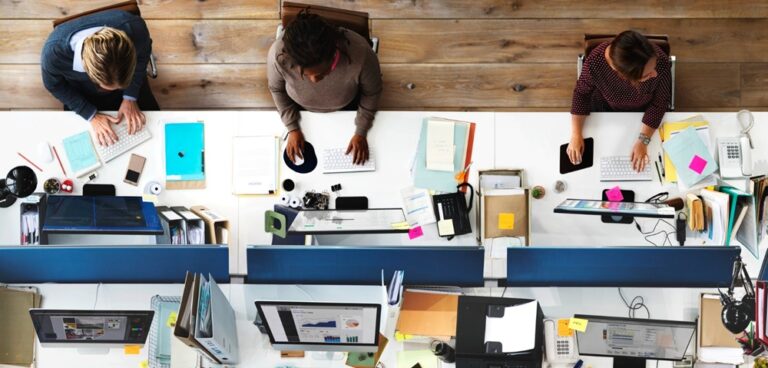Since the shift to working remotely in 2020, hybrid working has reshaped the modern workplace, offering employees greater flexibility while redefining the office’s role.
With fewer full-time employees in the office, companies are redesigning workplaces to meet the evolving needs of hybrid workers. No longer just a place for daily desk work, offices are evolving into dynamic hubs where collaboration, creativity, and well-being take centre stage. With employees splitting their time between home and the office, businesses are rethinking their workspaces to ensure that in-office days are productive.
These changes reflect a broader shift—where businesses focus not just on where employees work, but how they work best.
Workplace well-being in the hybrid era: What’s changing?
As hybrid working continues to be the norm for many workforces, employee wellbeing has become a key focus. While flexible work contributes to positive wellbeing, businesses are redesigning office spaces with wellbeing-focused environments to support hybrid employees.
A balanced office-home routine: The secret to better wellbeing in hybrid work
While working from home offers comfort and convenience, time in the office can contribute to better health, increased social interaction, and stronger work-life boundaries. A recent study found that the number of days spent in the office plays a key role in overall well-being.
Research shows that hybrid workers who attend the office just one or two days per week report the lowest levels of physical and mental wellbeing (50%), while those in the office three to four days per week experience better physical (60%) and mental (61%) wellbeing.
This suggests that while remote work offers convenience, regular in-office interaction and structured work environments contribute to better health, engagement, and productivity. Businesses that have yet to explore hybrid working will need to consider the advantages that flexible working has for their employees.
A new era of workplace design: Offices are changing to suit hybrid workers
As hybrid working evolves, offices are no longer just places to work, they’re environments designed to enhance wellbeing. With fewer employees on-site daily, businesses are shifting away from traditional desk-based setups and creating flexible, wellness-focused spaces that promote collaboration, relaxation, and productivity. By prioritising well-being in office design, businesses create spaces that make hybrid workers feel valued, engaged, and motivated when they come into the office.
Designed for balance: Why offices are investing in digital detox spaces
With hybrid workers spending much of their time on screens, whether at home or in the office, digital fatigue is a growing concern. In response, digital detox zones are emerging as a key feature of future workplaces, offering employees a calm, tech-free retreat to reset and recharge. These spaces are designed to reduce stress and enhance focus. They can include:
- No-device areas where employees can take a break from screens.
- Biophilic elements such as natural light, greenery, and earthy textures to create a soothing, restorative environment.
- Wellness activities, like mindfulness, yoga, or relaxation seating, to support mental well-being.
While digital detoxing isn’t new, 2025 is seeing a shift toward making these spaces a mainstream part of office design. By providing employees a place to disconnect and rebalance, businesses can help improve concentration, creativity, and overall job satisfaction, ensuring that office days feel productive and refreshing.
Flexible spaces for a flexible workforce: Breakout rooms have become a must-have feature
Evolving physical workspaces is one of the latest hybrid office trends that involves shifting away from rigid designs. Hybrid workers use office spaces differently from traditional full-time employees, they’re not just coming in to sit at a desk but to collaborate, connect, and focus. To support this shift, breakout rooms are becoming essential in modern office design, offering versatile, multi-purpose spaces that adapt to different working styles. These spaces can include:
- Casual collaboration areas for spontaneous discussions and teamwork.
- Private pods and phone booths for focused, distraction-free work.
- Relaxation rooms where employees can unwind and de-stress.
The future office isn’t just about meeting rooms as connection and collaboration are becoming more fluid. Businesses are integrating breakout zones with advanced technology, such as spatial audio and AI-powered transcription, to ensure seamless interactions between on-site and remote employees.
Flexibility first: Workers are actively seeking flexible jobs
One of the most important factors for business owners to consider is that office workers are currently committed to flexible working. Hybrid working has redefined work-life balance, shifting from rigid 9-to-5 schedules to a more flexible approach that aligns with individual needs.
Employees value the ability to balance work and personal life, with a 2023 State of Hybrid Work study by Owl Labs revealing that employees would take pay cuts to have more flexible working hours. Wellbeing also directly impacts performance with Gallup reporting that burned-out employees are 63% more likely to take sick days and 2.6 times more likely to seek a new job.
To address this, businesses are creating office environments that support hybrid workers, by including ergonomic workstations, breakout areas, and wellness spaces to ensure in-office days feel both productive and restorative. By fostering a balanced, wellbeing-focused work culture, businesses can enhance employee satisfaction and long-term retention. For employers supporting parents and families, flexible working policies are beneficial as they enable them to adjust their routines based on childcare responsibilities.
Flexibility, wellbeing & smart office design are key to hybrid working success
Since 2020, the work landscape has changed significantly. There is a shift away from fully remote work and a renewed reliance on offices, whether through full-time attendance or hybrid working. While flexibility remains a key benefit, businesses must ensure their workspaces actively support employee wellbeing.
From digital detox zones that combat screen fatigue to breakout rooms that encourage collaboration, office designs are evolving to meet the changing needs of hybrid workers. Companies must create offices that attract and retain workers by prioritising wellbeing, flexibility, and engagement. Creating workspaces that employees want to return to, not out of obligation but because they offer a space to thrive, are the offices of the future.

